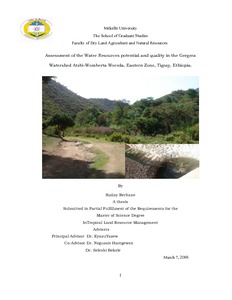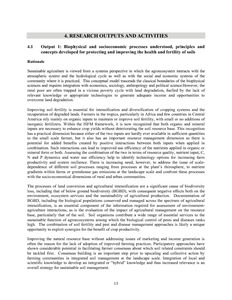Assessment of the water resources potential and quality in the Gergera Watershed Atsbi-Womberta Woreda, eastern Zone, Tigray, Ethiopia
Water demand is increasing with population growth and agricultural practice leading into industrialization. Hence, the information on spatial and temporal availability of water will be helpful for the optimum utilization and sustainability of water resource. Seasonal and Spatial pattern of water availability was computed based on the water balance to facilitate better management of available water resources. The study was conducted on gergera watershed where in between -39º 30' – 39º 45' E and 13º 30' – 13º 45' N with an area extent of 8.02 km2.



